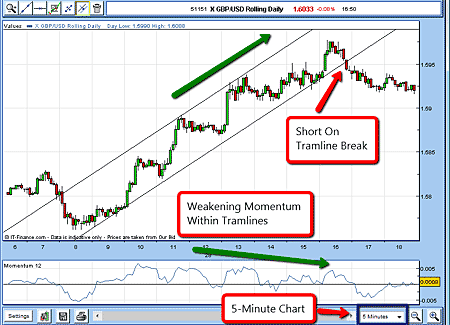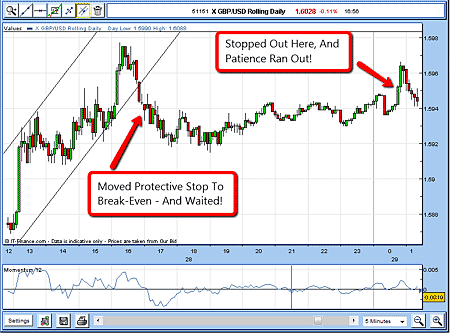How to be a successful day trader: stay disciplined
Day-trading - making quick hit-and-run trades - can be an attractive option for spread betters who have the time to constantly monitor the markets. But to stay out of trouble, you need to be disciplined.
Get the latest financial news, insights and expert analysis from our award-winning MoneyWeek team, to help you understand what really matters when it comes to your finances.
You are now subscribed
Your newsletter sign-up was successful
Want to add more newsletters?

Twice daily
MoneyWeek
Get the latest financial news, insights and expert analysis from our award-winning MoneyWeek team, to help you understand what really matters when it comes to your finances.

Four times a week
Look After My Bills
Sign up to our free money-saving newsletter, filled with the latest news and expert advice to help you find the best tips and deals for managing your bills. Start saving today!
So far, I have traded the markets on medium-to-long time-frames (trades lasting days and weeks, in other words). Using the weekly, daily and hourly charts gives us the luxury of planning our entry and exit orders well ahead of time, so there is no need to be constantly watching your trading screen. If you have other things to be getting on with such as a day job this is the best style of trading for you.
On the other hand, if you have the time to constantly watch your monitor, you may be attracted to day-trading. The aim of day-trading is to make quick hit-and-run trades, leaving your positions flat at the end of the day (being 'flat' means having no open positions).
But you should be aware that with day-trading, you only have a short window of opportunity to exploit any decent entry points and you need to be near your screen to catch them. This can be frustrating, especially when you are stalking a promising trade.
MoneyWeek
Subscribe to MoneyWeek today and get your first six magazine issues absolutely FREE

Sign up to Money Morning
Don't miss the latest investment and personal finances news, market analysis, plus money-saving tips with our free twice-daily newsletter
Don't miss the latest investment and personal finances news, market analysis, plus money-saving tips with our free twice-daily newsletter
Day-trading the pound an exercise in staying awake
Here is an example of day-trading the GBP/USD. This market trades almost 24 hours a day, and is very liquid so there will be plenty of action during normal business hours, regardless of where you are located. As with all currency (FX) markets, I tend to trade between 8am and 9pm that gives me enough scope to root out promising trades.
On 28 October, I was looking for a short trade, as the daily charts were showing the market eating into overhead resistance. Around 8am, I saw the market begin to rally, so I decided to watch for signs of a possible top. At that stage, I had no idea where or when the top might occur.
I switched to my five-minute chart, and as the day progressed, the market climbed in a series of 'steps' but contained within a pair of tramlines.
Here is the chart (this shows five minute moves in GBP/USD, between 6am and 6pm on 28 October):

As the market climbed, I noted the momentum readings were weakening (as indicated by the green arrow). To me, this suggested the buying power was running out of steam and that I could expect a reversal at any time. So I decided to watch closely for a break of the lower tramline. The market had climbed from the 1.5770 area to the 1.5970 area a move of two cents.
This is a good move for a day-trade. I reckoned that any break of the tramline would signal the early stages of a new down move. So I asked how far down I could expect the move to take the market and importantly, in what time frame?
A down move can often occur more quickly than the preceding rally, so I expected a move of at least one cent to take place within three hours. Might not sound like much, but that would give a profit of £100 on my £1 bet.
But if the market decided not to obey my script, I would look to abandon the trade. That's the discipline I employ when day-trading, to keep me out of trouble!
As the market was about to break the tramline at around 4pm (eight hours into this rally), I placed a sell order just under the line at 1.5940, and was promptly filled. If I was to be wrong, a move above the high at 1.5980 would prove it, so that was where I put my protective stop.
28 Oct sold £1 GBP rolling @ 1.5940.
Protective stop @ 1.5980.
Risk £40 (1% of my £4,000 starting capital)
Right away, the market dropped down to the 1.5920 level. I moved my stop down using my break-even rule. For the next hour or two, the market just drifted with no clear direction, and I had trouble staying awake by this time. And as the trading day ended, the market simply fell asleep!

As I came back to the office next morning, I saw my trade had been stopped out at my price.
28 Oct bought £1 GBP rolling @ 1.5940.
No gain or loss.
The market had not behaved as I had expected (it does happen sometimes!), but no damage was done. That is an achievement of sorts, as our principal mantra of trading is: 'protect your capital'.
I had invested time and effort on this trade, and I came up empty-handed. Not surprisingly, I decided to take a break from this market and look elsewhere. Luckily, when day-trading, there is always at least one situation in either the currencies, the stock indexes, or gold that looks promising.
Get the latest financial news, insights and expert analysis from our award-winning MoneyWeek team, to help you understand what really matters when it comes to your finances.
John is is a British-born lapsed PhD physicist, who previously worked for Nasa on the Mars exploration team. He is a former commodity trading advisor with the US Commodities Futures Trading Commission, and worked in a boutique futures house in California in the 1980s.
He was a partner in one of the first futures newsletter advisory services, based in Washington DC, specialising in pork bellies and currencies. John is primarily a chart-reading trader, having cut his trading teeth in the days before PCs.
As well as his work in the financial world, he has launched, run and sold several 'real' businesses producing 'real' products.
-
 Average UK house price reaches £300,000 for first time, Halifax says
Average UK house price reaches £300,000 for first time, Halifax saysWhile the average house price has topped £300k, regional disparities still remain, Halifax finds.
-
 Barings Emerging Europe trust bounces back from Russia woes
Barings Emerging Europe trust bounces back from Russia woesBarings Emerging Europe trust has added the Middle East and Africa to its mandate, delivering a strong recovery, says Max King